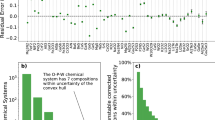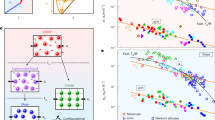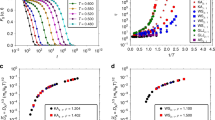Abstract
An important measurable parameter in the study of vapour-liquid equilibria in two-phase binary mixtures is the volatility ratio (α) defined by N1g.N2/N1.N2g, where N1g is the mol fraction of component 1 in the vapour and N2 that of component 2, while N1 and N2 are the corresponding quantities for the liquid. In view of the difficulties inherent in the determination of α, the need for a thermodynamic test of the reliability of experimental data has been expressed1. In this note such a test will be described and also a method given for deriving δGE from the curve of α plotted against N1 where δGE is the excess 4 free energy of formation of the mixture over an ideal mixture of the same composition. A study of this quantity (δGE) is fundamental to the investigation of the structure of liquid mixtures.
This is a preview of subscription content, access via your institution
Access options
Subscribe to this journal
Receive 51 print issues and online access
$199.00 per year
only $3.90 per issue
Buy this article
- Purchase on Springer Link
- Instant access to full article PDF
Prices may be subject to local taxes which are calculated during checkout
Similar content being viewed by others
References
Carlsen and Colburn, Ind. Eng. Chem., 34, 1533 (1942).
Author information
Authors and Affiliations
Rights and permissions
About this article
Cite this article
HERINGTON, E. A Thermodynamic Test for the Internal Consistency of Experimental Data on Volatility Ratios. Nature 160, 610–611 (1947). https://doi.org/10.1038/160610b0
Issue Date:
DOI: https://doi.org/10.1038/160610b0
This article is cited by
-
Production of 2-phenylethyl acetate via reactive distillation
Chemical Papers (2020)
-
Thermodynamics of the isopropanol/n-hexane and isopropanol/n-heptane systems. Part III. Gas/liquid equilibrium
Monatshefte f�r Chemie (1981)
-
Excess thermodynamic properties of isomeric butanols withn-heptane at 55°C
Proceedings / Indian Academy of Sciences (1980)
Comments
By submitting a comment you agree to abide by our Terms and Community Guidelines. If you find something abusive or that does not comply with our terms or guidelines please flag it as inappropriate.



